Entertainment
The 15 movies we're most excited about this fall

Hollywood’s pipeline may be slowed due to the aftereffects of strikes we’re still dealing with, but our snapshot of the best films of the season is as packed as ever. Big-budget musicals, dark supervillain sequels, big-budget musicals that are dark supervillain sequels, international charmers and sharp indie standouts all crowd the calendar. Cautionary tales of personal transformation jockey with euphoric ones; Oscar-winning legends compete for eyeballs with first-time visionaries; and gladiators do battle with other gladiators. We asked our film writers for their personal must-sees.
‘My Old Ass’ (Sept. 13)

Maisy Stella in the move “My Old Ass.”
(Amazon Studios)
One summer night before she leaves for college, an 18-year-old girl does mushrooms and finds herself face-to-face with the 39-year-old version of herself. That plot description doesn’t exactly suggest a heartfelt tearjerker of a movie. (Neither does the title.) But that’s exactly what director Megan Park’s feature debut is: a short, sweet gem of a coming-of-age story that will leave you looking back at your adolescence with rose-colored glasses. Aubrey Plaza plays the older version of the protagonist, though it’s newcomer Maisy Stella — whom you might know as the younger sister from the viral sibling singing duo Lennon & Maisy — whose performance you’ll leave talking about. The film, which was produced by Margot Robbie, slayed at Sundance last year and was quickly snapped up for a reported $15 million after a bidding war. If we had to call it now, we’d say Barbie has another hit on her hands. — Amy Kaufman
‘A Different Man’ (Sept. 20)
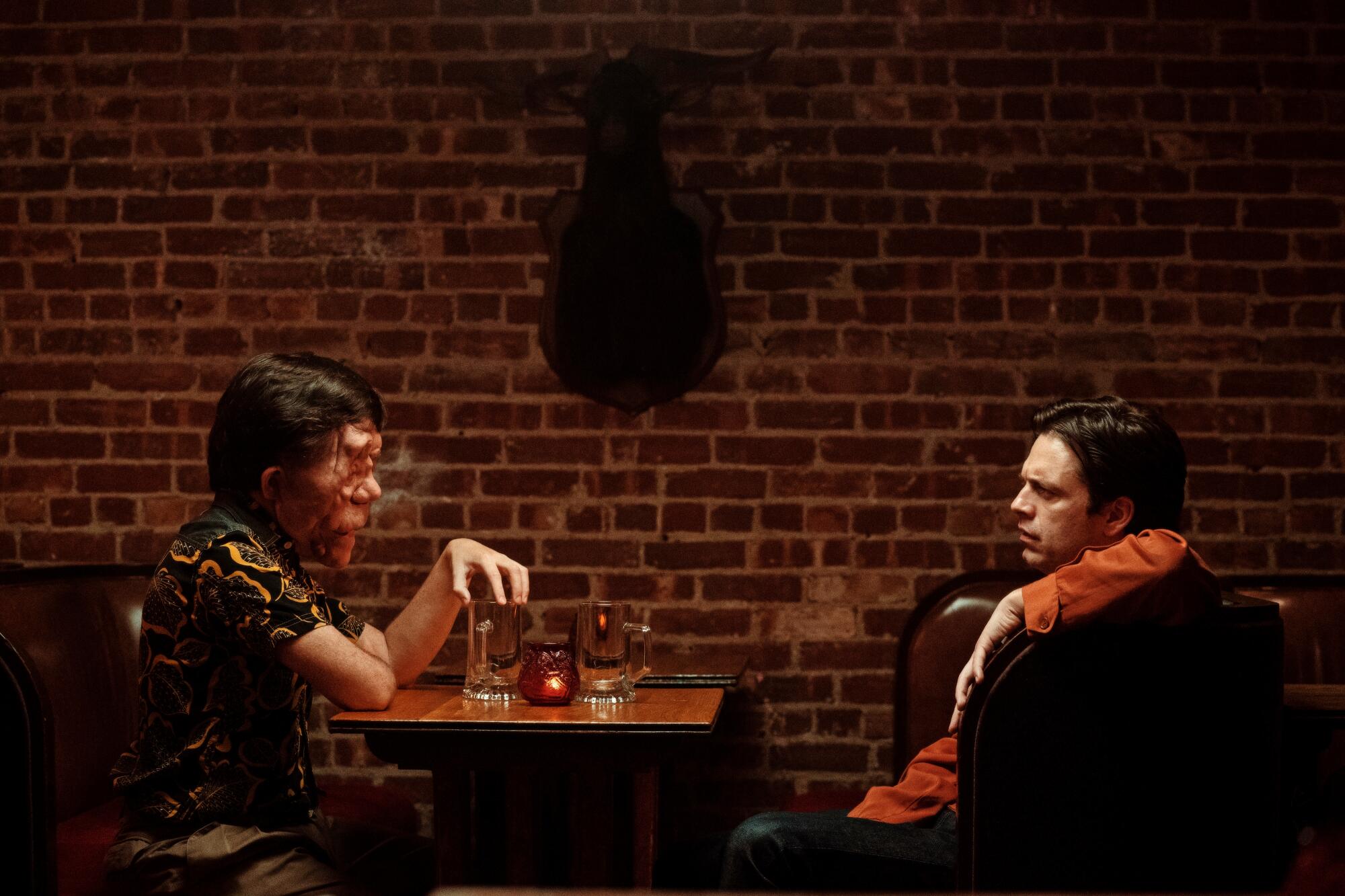
Adam Pearson, left, and Sebastian Stan in the movie “A Different Man.”
(Matt Infante / A24)
Pitched somewhere between the body horror of David Cronenberg and the meta surrealism of Charlie Kaufman, writer-director Aaron Schimberg’s darkly satirical psychological thriller is hard to describe and even harder to shake. Sebastian Stan stars as an aspiring actor born with facial disfigurements who undergoes an experimental procedure to transform his appearance, only to find himself losing the role he was born to play — himself — to a man with the same deformity (played by “Under the Skin’s” Adam Pearson, who has neurofibromatosis). The A24 film, which earned strong buzz at this year’s Sundance and co-stars Renate Reinsve (“The Worst Person in the World”), ambitiously takes on complex themes of identity and societal preconceptions about beauty and disability. Most of all, it is just plain different. — Josh Rottenberg
‘The Substance’ (Sept. 20)

Demi Moore in the movie “The Substance.”
(Christine Tamalet / Mubi)
“Everybody’s a dreamer / And everybody’s a star / And everybody’s in movies / It doesn’t matter who you are.” The opening lines to the Kinks’ classic song “Celluloid Heroes,” about the ephemeral nature of fame, comes to mind when watching Coralie Fargeat’s “The Substance,” a body-horror film that manages to be both primal and compassionate, bludgeoning and insightful. Elisabeth Sparkle (Demi Moore, never better) has a star on Hollywood Boulevard, but it has faded and fallen into disrepair, much like the career of its honoree. She’s on the wrong side of 50, has been fired from her retro-style exercise show and is so desperate that she’s considering submitting to a back-alley rejuvenation regime. Soon, Elisabeth has a clone, Sue (Margaret Qualley), young and taut. For the science to work, Elisabeth and Sue must switch places every seven days. But there wouldn’t be a movie if that went off without a hitch, and as the situation begins to deteriorate, Fargeat amps up the gore and gruesomeness to epic levels. It’s truly ugly. And that’s the point. Because, as Ray Davies noted behind the mic, “Success walks hand in hand with failure on Hollywood Boulevard.” — Glenn Whipp
‘Megalopolis’ (Sept. 27)
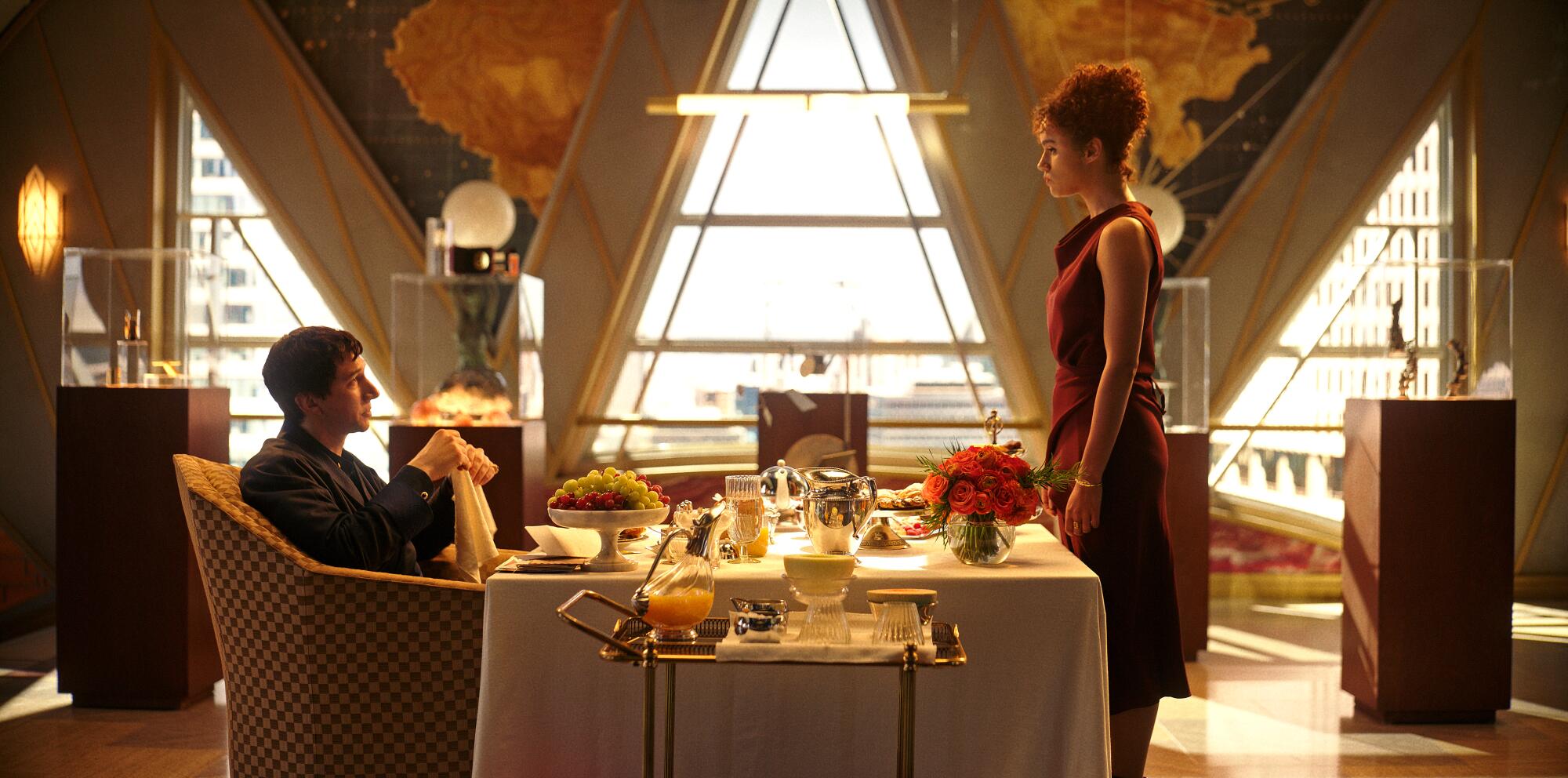
Adam Driver and Nathalie Emmanuel in the movie “Megalopolis.”
(Lionsgate)
Was it just a dream or did Francis Ford Coppola debut his long-gestating passion project (and first movie in 13 years) at this year’s Cannes Film Festival? He did! I’m not making that up. And I can’t wait to see it again, in all its radical craziness. “Megalopolis” isn’t well-served by synopses that call it a “city poem” or yoke its wild ambitions to ancient Rome’s power struggles or municipal intrigue. Those things are true, fine, but let’s stop trying to make this movie into another crime epic like “Godfather.” It is very much its own beast, loosely about a gifted architect (Adam Driver) and the many people around him who either help or hinder his vision. You’re going for the deep ensemble, which includes Giancarlo Esposito, Kathryn Hunter, Laurence Fishburne, Dustin Hoffman and Aubrey Plaza, the latter playing some kind of dazzling media creation named Wow Platinum. — Joshua Rothkopf
‘Joker: Folie à Deux’ (Oct. 4)

Lady Gaga and Joaquin Phoenix in the movie “Joker: Folie à Deux.”
(Niko Tavernise / Warner Bros. Pictures)
I have remained relatively neutral about the first “Joker” since it came out in 2019, even when the gritty Batman villain origin story became a box-office smash and won two Oscars. But the fact that the Warner Bros. sequel is actually a romance-driven jukebox movie-musical — complete with Lady Gaga as Harley Quinn — is a helluva choice, one that I have to see to believe. Director Todd Phillips, I will most definitely be seated for this comic-book-based song-and-dance, especially since I’ve been waiting for Joaquin Phoenix to sing onscreen again since his brilliant turn as Johnny Cash in “Walk the Line.” I’m excited to witness his maniacal vocal stylings on haunting covers of well-known songs, which I’ll probably never be able to hear in quite the same way again. — Ashley Lee
‘The Apprentice’ (Oct. 11)
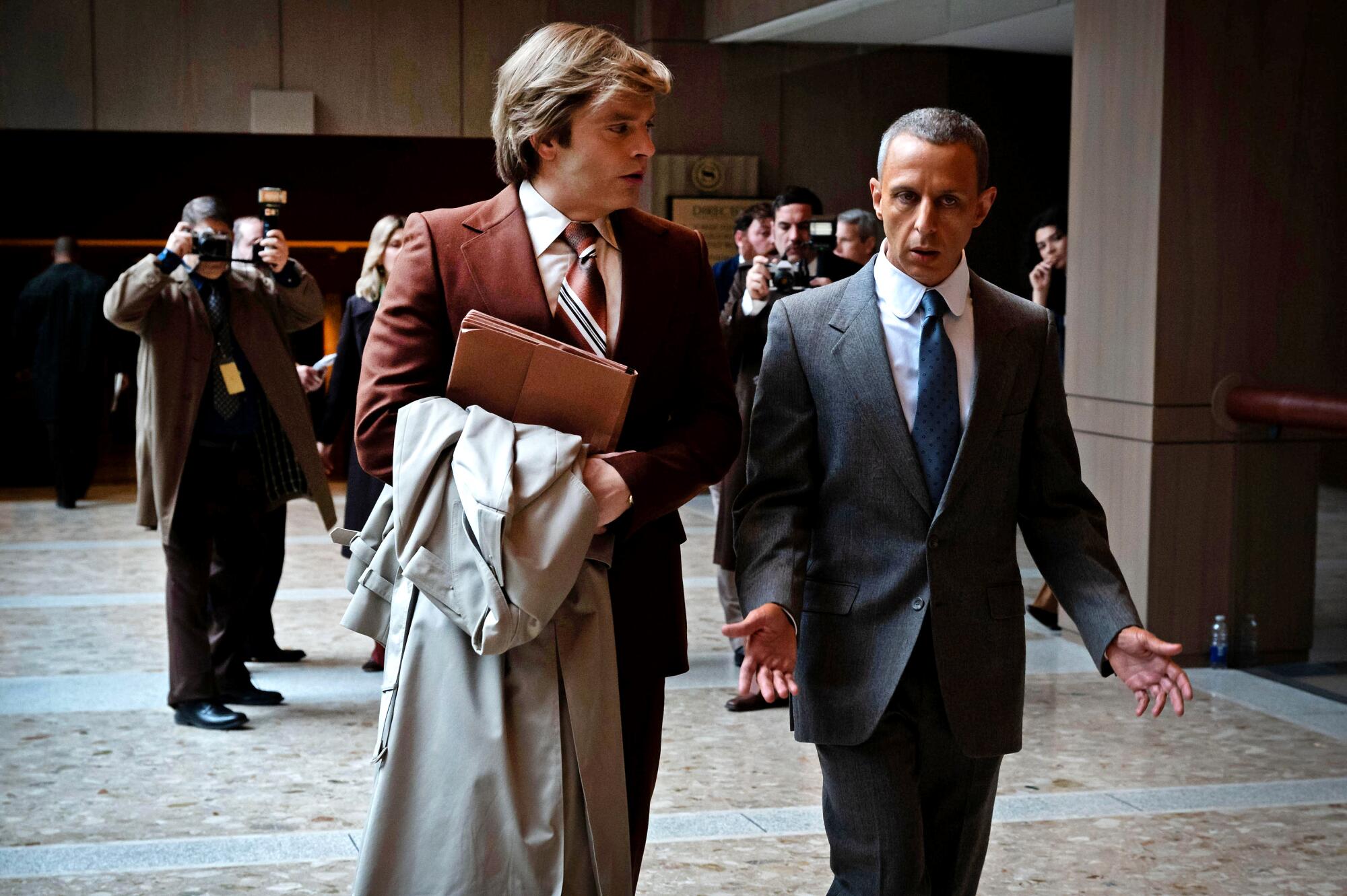
Sebastian Stan, left, and Jeremy Strong in the movie “The Apprentice.”
(Pief Weyman / Apprentice Productions)
Don’t be fooled by the title — this is not a big-screen reboot of the hit NBC reality show in which contestants competed for a top spot in Donald Trump’s real estate empire. In fact, the tagline of this film could very well be “The movie Donald Trump doesn’t want you to see.” Although the former president and current Republican presidential nominee has not seen the film, he is fighting to keep this fictionalized account of his early days in real estate and his relationship with infamous attorney Roy Cohn out of theaters. “The Apprentice,” which scored favorable reviews out of Cannes, is a less-than-flattering portrait of Trump, and has a scene in which he assaults his first wife, Ivanka. Starring Sebastian Stan (“Captain America: The First Avenger”) as Trump and Jeremy Strong (“Succession”), it will definitely pour more fuel on an already volatile election season. — Greg Braxton
‘We Live in Time’ (Oct. 11)
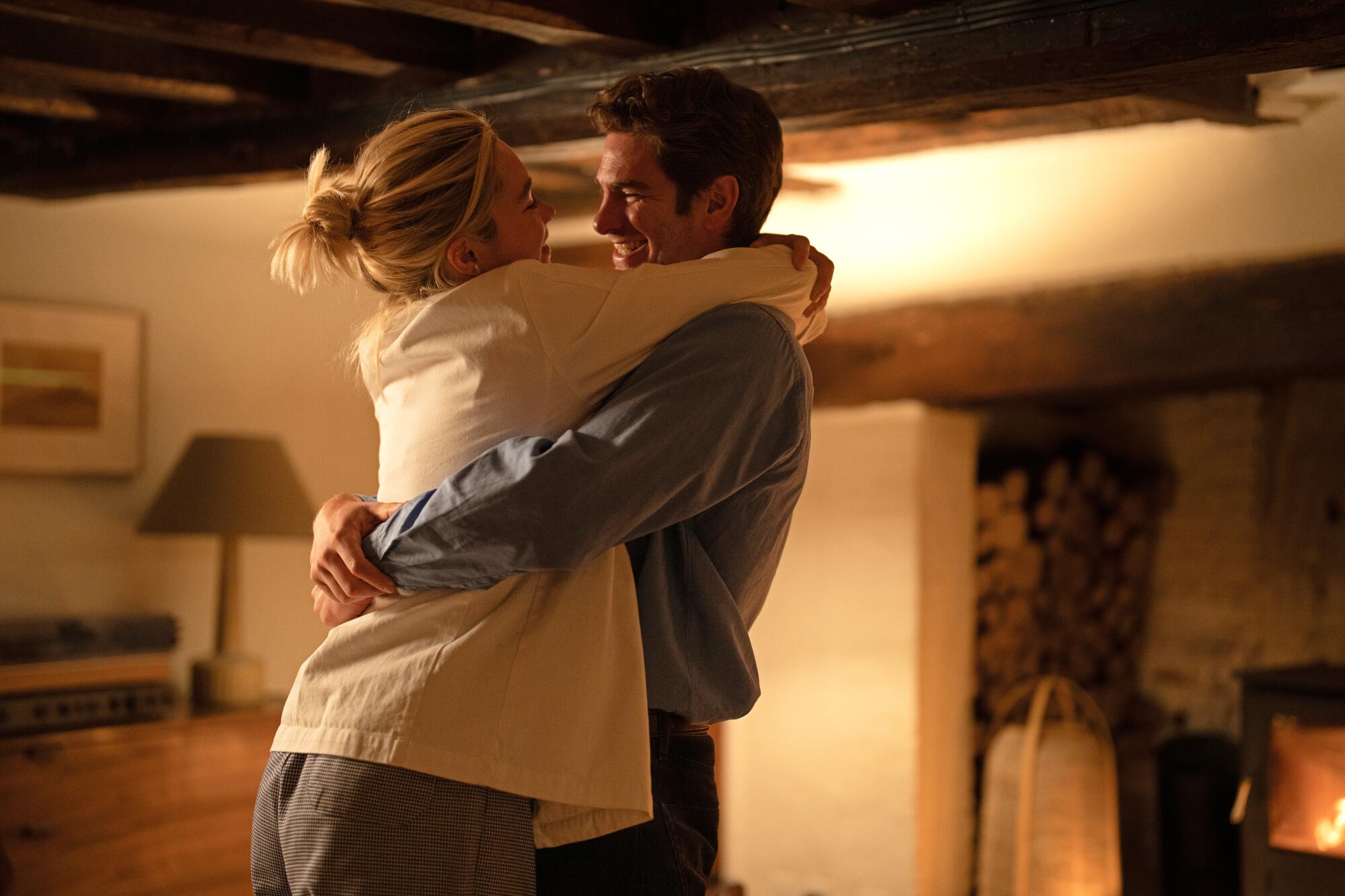
Florence Pugh and Andrew Garfield in the movie “We Live in Time.”
(Peter Mountain / Studiocanal)
Do I need to say anything more than this is an A24 movie starring Florence Pugh and Andrew Garfield? Really? OK. Watch the trailer and learn that they’re playing characters who A) have an adorable daughter, B) seem to have had a “meet cute” involving Alma (Pugh) running over Tobias (Garfield) with her car, and C) are eventually dealing with some kind of serious illness as there’s a cut to Alma sitting in a doctor’s office with her head shaved. If a trailer alone makes you cry, what hope do you have for surviving the film intact, particularly given that it’s directed by John Crowley, who did such a lovely job on the Oscar-nominated, big-hearted “Brooklyn”? “I’m guilty of looking ahead instead of right in front of me,” Tobias says at one point, except he’s choking out the words because … how can he not? He’s sobbing. Are you ready for this? (I’m not.) — Glenn Whipp
‘Anora’ (Oct. 18)

Mikey Madison, right, and Mark Eydelshteyn in the movie “Anora.”
(Neon)
When Sean Baker won the Palme d’Or for “Anora” from a Cannes jury headed by Greta Gerwig, it felt as if an entire generation of American independent filmmakers had fully come of age. While retaining a sensibility of scrappy, playful creativity, Baker has also matured in his vision to come up with something like a clear-eyed fantasy: a realist fairy tale. Mikey Madison gives a vivid performance as a stripper in Brighton Beach, New York, who falls into a whirlwind romance with the son of a super-rich Russian oligarch. Impulsively, they get married in Las Vegas. It all seems to be a dream come true until word reaches his parents, who will do anything to force an annulment. There has always been something anthropological about Baker’s filmmaking in works like “Starlet,” “Tangerine” and “The Florida Project” as he explores otherwise unseen subcultures. With “Anora” that feeling remains, but the movie pushes further to become a rich blend of emotions and tones, veering with reckless abandon from raucous comedy to startlingly vivid compassion and, ultimately, understanding. — Mark Olsen
‘Salem’s Lot’ (Max; October TBA)
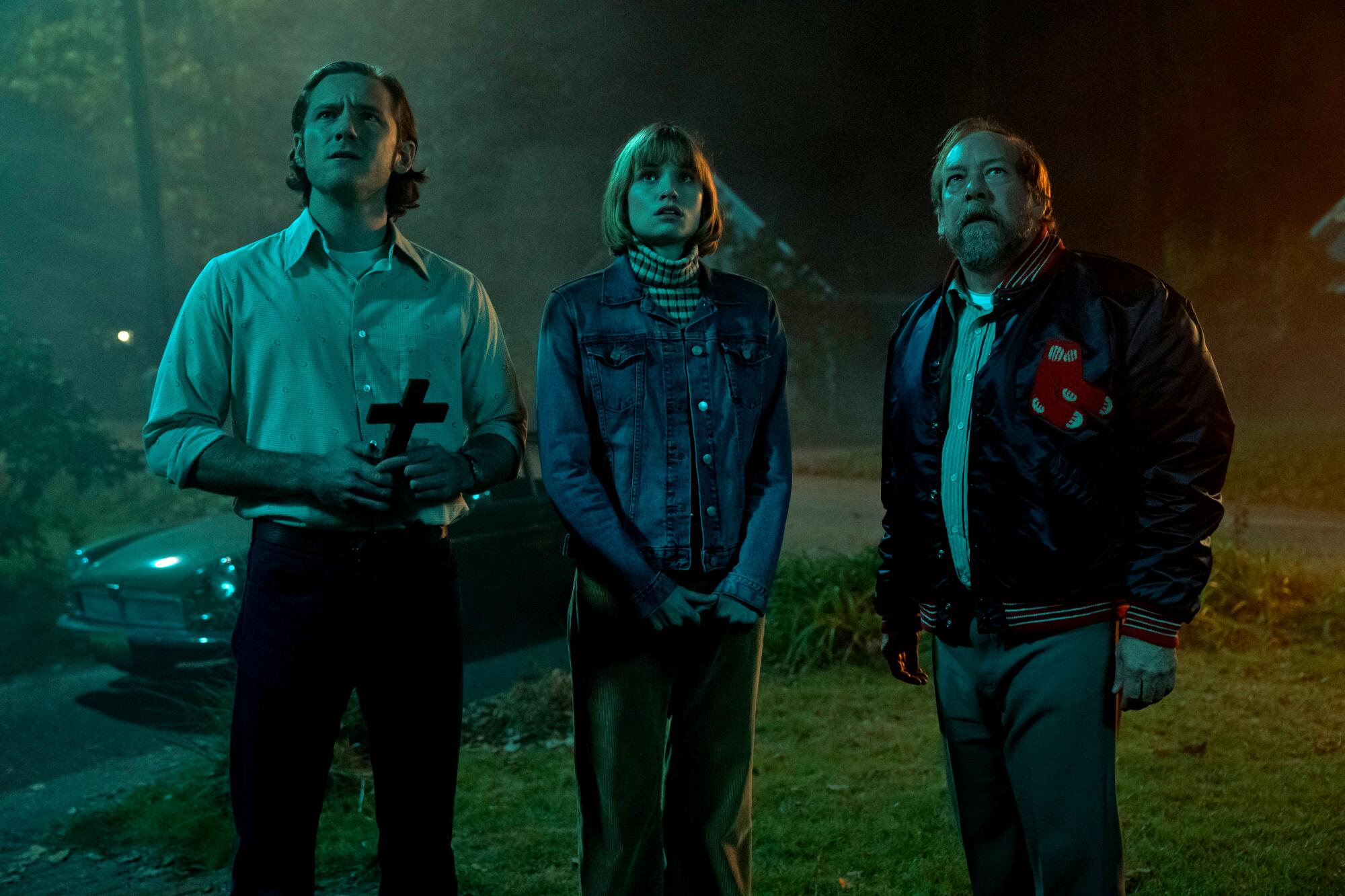
Lewis Pullman, left, Makenzie Leigh and Bill Camp in the movie “Salem’s Lot.”
(Justin Lubin / Warner Bros. Pictures)
After a period of worrying if the movie version of Stephen King’s 1975 vampire novel would even see the light of day (or the dark of a living room) or get deleted by a team of Warner Bros. bean counters, it can be confirmed that it is definitely coming to Max this Halloween season. Even sight unseen, there’s a lot this project has going for it. Director-screenwriter Gary Dauberman has a natural way with King’s flow (he’s the one who cracked the two-part blockbuster adaptation of “It”), and the cast includes Lewis Pullman, Alfre Woodard and Bill Camp. But we’ll take the word of King himself, who moved the needle on the film’s indeterminate future when he posted on X: “Between you and me, Twitter, I’ve seen the new SALEM’S LOT and it’s quite good. Old-school horror filmmaking: slow build, big payoff. Not sure why WB is holding it back; not like it’s embarrassing, or anything. Who knows. I just write the f— things.” — Joshua Rothkopf
‘Blitz’ (Nov. 1)
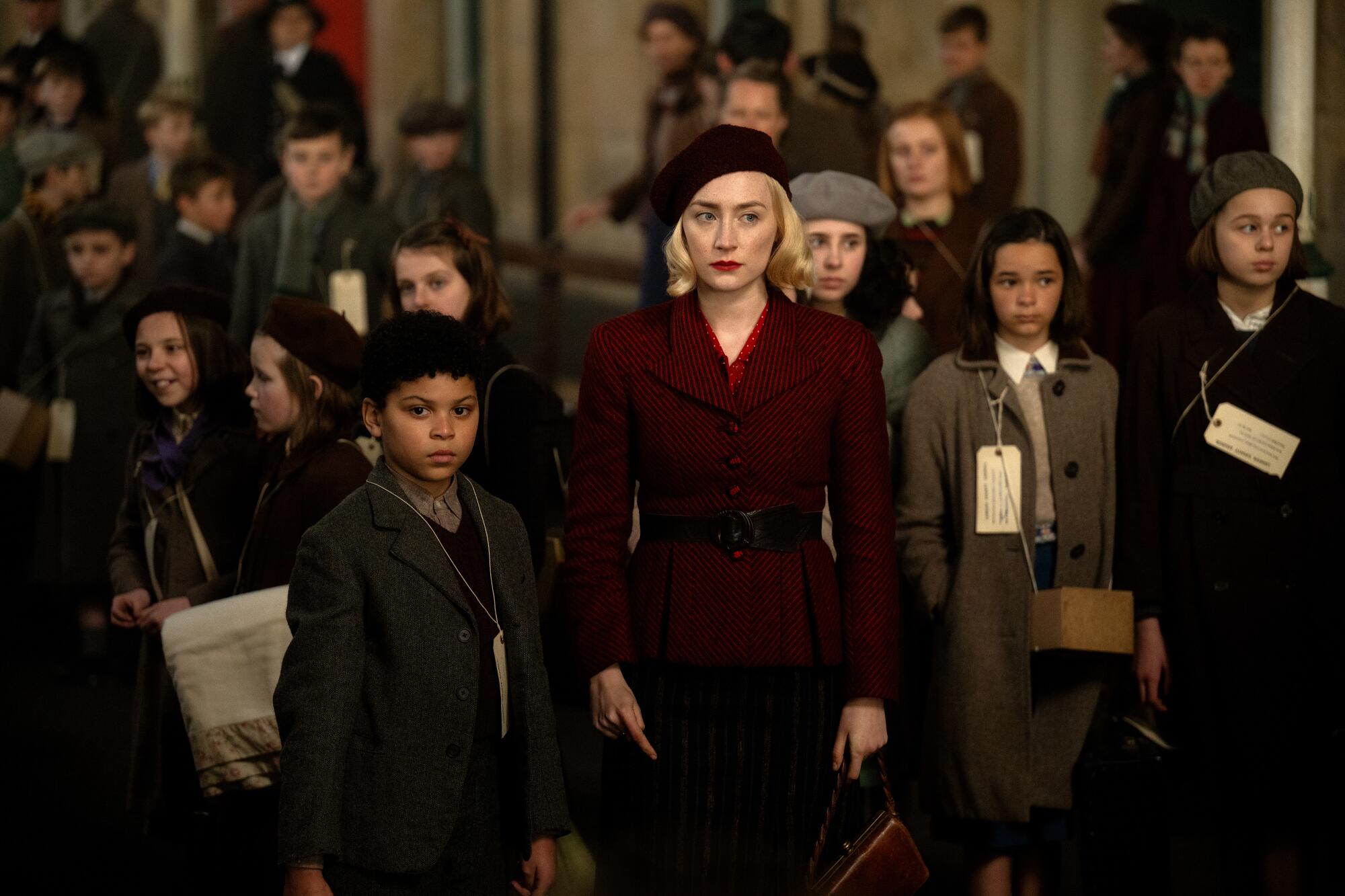
Elliott Heffernan and Saoirse Ronan in the movie “Blitz.”
(Parisa Taghizadeh / Apple TV+)
It would not be a stretch to call Steve McQueen one of our greatest living historical filmmakers. The prizewinning visual artist made his feature debut in 2008 with “Hunger,” an unnervingly visceral portrait of hunger-striking Irish Republican prisoners, and though he’s since fashioned well-regarded contemporary fictions, his finest work has applied his crisp, modern aesthetic to the freedom struggles of the past. Consider the searing “12 Years a Slave,” set against the brutal backdrop of plantation life in antebellum Louisiana; “Small Axe,” a suite of five exquisite films about the Windrush generation of U.K. African Caribbean immigrants; and, most recently, “Occupied City,” a finely detailed document of Amsterdam under the Nazis. In other words, if there is a director who can find new relevance in the oft-told tale of the German bombing of London during World War II, it’s undoubtedly McQueen. — Matt Brennan
‘Conclave’ (Nov. 1)
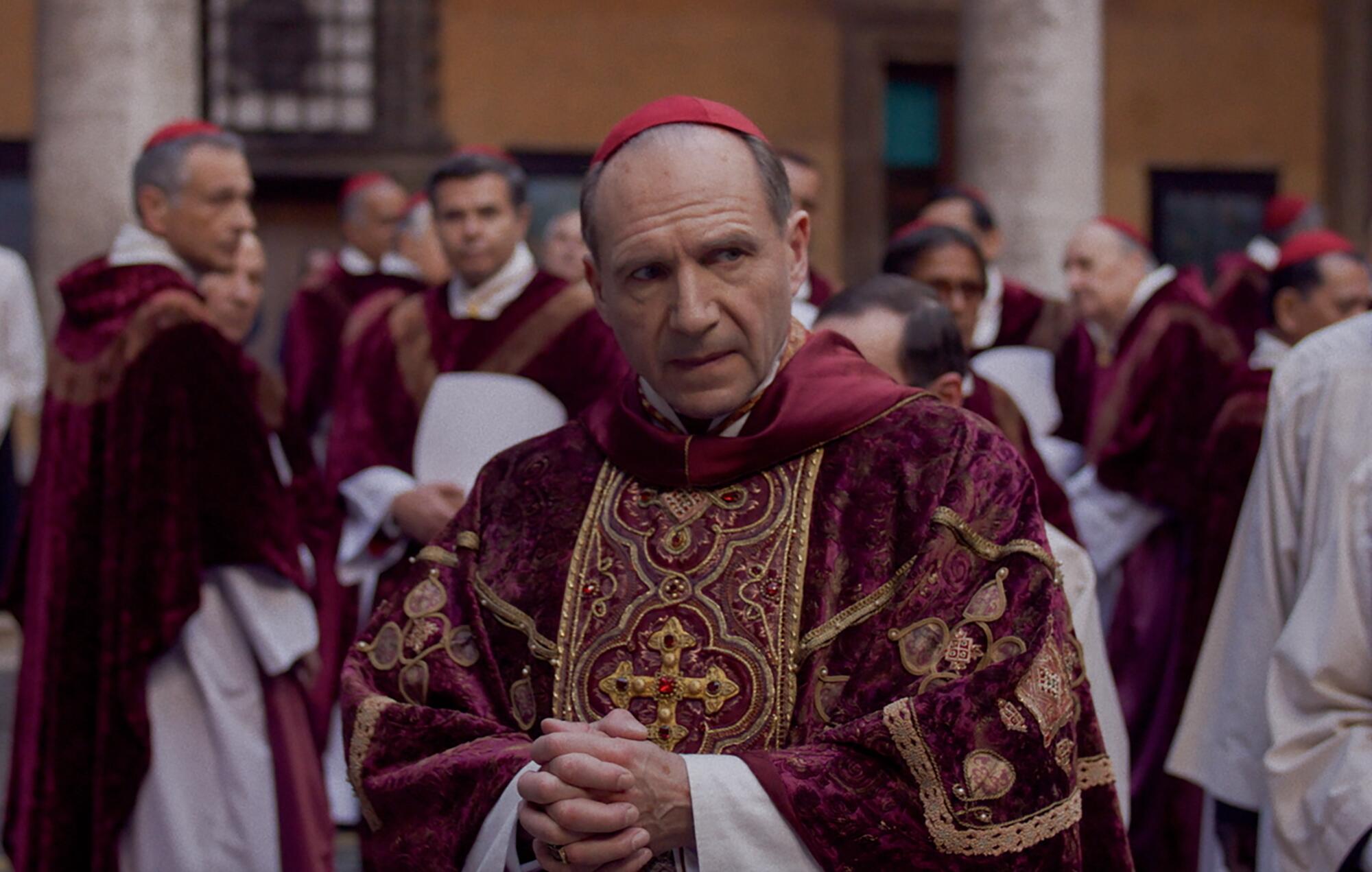
Ralph Fiennes in the movie “Conclave.”
(Focus Features)
Bless me, Father, for I have sinned: In the past few weeks I have watched the trailer for “Conclave” so many times it could be considered gluttony. For pain or pleasure I do not yet know — the movie doesn’t premiere until Nov. 1. But whether it’s “Angels & Demons,” “The Two Popes” or “The Young Pope,” I’m a sucker for a Vatican drama. Especially one starring Ralph Fiennes, Stanley Tucci, John Lithgow, Lucian Msamati and Sergio Castellitto, with Isabella Rossellini thrown in as a feisty sister. Directed by Oscar winner Edward Berger (“All Quiet on the Western Front”), “Conclave” is adapted from Robert Harris’ novel of the same name. Its plot is simple: In Vatican City, the pope is dead and Cardinal Lawrence (Fiennes) is tasked with overseeing the election of a new one. But before the black smoke can be replaced by white (indicating a new pope), all manner of intrigue, scandal and shocking secrets will be revealed. It may not have priest-assassins or the detonation of an anti-matter device, but as Stanley Tucci might have said in “The Devil Wears Prada,” give me a full cassock skirt and a sea of zucchettos and I’m in. — Mary McNamara
‘Emilia Pérez’ (Nov. 1; on Netflix Nov. 13)
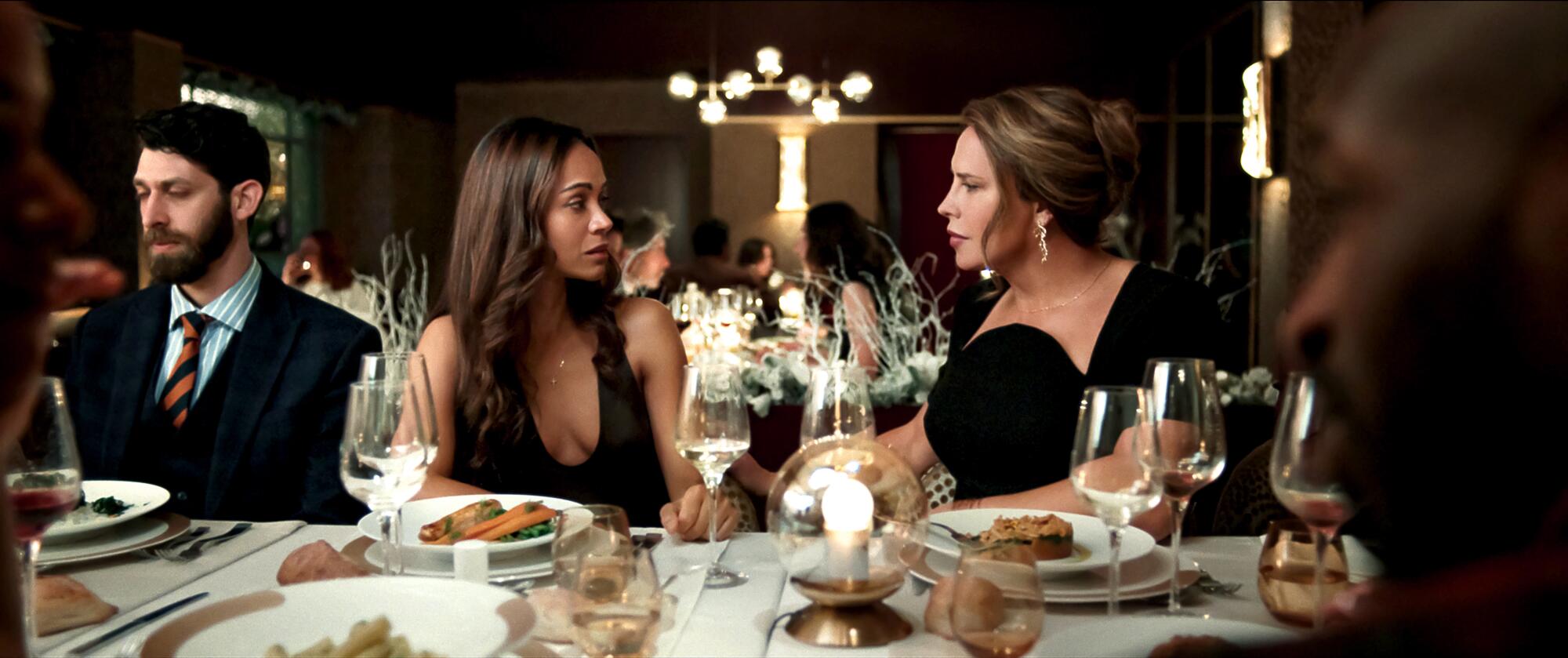
Zoe Saldana, left, and Karla Sofía Gascón in the movie “Emilia Pérez.”
(Netflix)
On paper it seems more Mad Lib than movie: acclaimed French auteur Jacques Audiard making a Mexican-set melodrama about a ruthless crime boss who transitions to being a woman, in a film that won a joint best actress prize at Cannes for co-stars Zoe Saldana, Selena Gomez, Adriana Paz and Karla Sofía Gascón. And it’s a musical, with electrifying song and dance numbers. “Emilia Pérez” coalesces in unpredictable ways, making perfect sense even as its audacious ambitions should seem out of reach. The performances truly are astonishing, with Saldana and Gomez in particular showing previously unseen sides and Gascón both tender and fearsome. It takes a filmmaker with Audiard’s specific skills, an unerring sense of story, finely tailored style and vision, to hold it all together. A story about finding and becoming the person you most want to be, “Emilia Perez” is truly more than the sum of its parts. — Mark Olsen
‘All We Imagine as Light’ (Nov. 15)

Kani Kusruti, left, and Divya Prabha in the movie “All We Imagine as Light.”
(Petit Chaos)
Payal Kapadia’s drama swept into Cannes near the festival’s tail end and quickly upturned prize expectations, leaving with the Grand Prix, an award previously won by “The Zone of Interest,” “BlacKkKlansman” and “Inside Llewyn Davis.” The movie’s lovely satisfactions shouldn’t be overhyped: After an initial section of urban ennui (gorgeously photographed like a Wong Kar-wai movie by cinematographer Ranabir Das) in which two Mumbai nurses grapple with romantic unhappiness, the movie takes a right turn as they head out of town to a jungly beachside community where anything seems possible. Hollywood has told this story before, it can be fairly said, and Kapadia channels those pleasures of sisterly solidarity and getting your groove back while also adding a subtle layer of spiritual awakening. It’s the kind of international title that could connect with anyone hoping to dream bigger. — Joshua Rothkopf
‘Gladiator II’ (Nov. 22)

Paul Mescal in the movie “Gladiator II.”
(Aidan Monaghan / Paramount Pictures)
Released in the bygone era of AD 2000, the original “Gladiator” may now feel a bit like ancient history itself, but in its time, director Ridley Scott’s epic was a bona fide blockbuster, earning more than $460 million worldwide and five Oscars, including best picture, and turning Russell Crowe into a movie star. Now, after years of fits-and-starts development, the 86-year-old Scott returns to the arena, with Paul Mescal stepping into the sandals of Lucius, the son of Lucilla (Connie Nielsen) and nephew of the tyrannical Commodus, originally played by Joaquin Phoenix. After his home is invaded by a Roman army led by Pedro Pascal’s general Marcus Acacius, Lucius is forced to fight as a gladiator under the tutelage of Macrinus (Denzel Washington), a former slave who opposes the rule of the young twin emperors Caracalla (Fred Hechinger) and Geta (Joseph Quinn). We’ll see you in the Colosseum. — Josh Rottenberg
‘Wicked’ (Nov. 22)
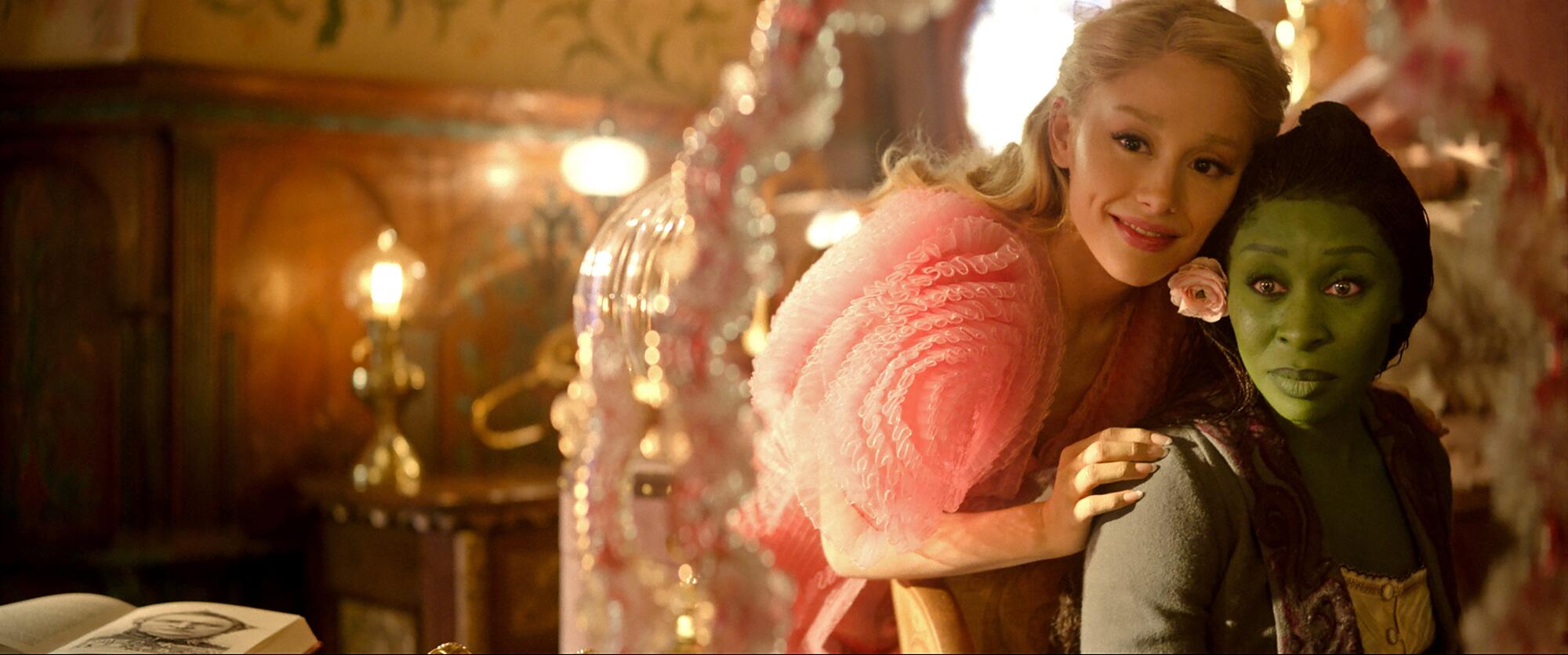
Ariana Grande, left, and Cynthia Erivo in the movie “Wicked.”
(Universal Pictures)
Set before Dorothy’s arrival in “The Wizard of Oz,” this vibrant movie-musical centers on the two women who become Glinda the Good Witch and the Wicked Witch of the West, and the change in their friendship when society pits them against each other. While the film adaptation of this stage musical phenomenon has been in intermittent development since shortly after it opened on Broadway in 2003, I’m thrilled that the Universal project is finally coming to fruition with director Jon M. Chu (“In the Heights” and “Crazy Rich Asians”). And I’m ready to marvel at Ariana Grande and Cynthia Erivo’s performances of Stephen Schwartz’s songs, which span comical numbers, soaring anthems, heartbreaking ballads and bittersweet duets. That we’ll have to wait a year for the second half of a two-part rollout is quite fine with me. — Ashley Lee

Movie Reviews
Movie Review: ‘Goat’ – Catholic Review

NEW YORK (OSV News) – “Goat” (Sony) is an animated underdog sports comedy populated by anthropomorphized animals. While mostly inoffensive, and thus suitable for a wide audience — including teens and older kids — the film is also easily forgotten.
The amiable proceedings center on teen goat Will Harris (voice of Caleb McLaughlin). As opening scenes show, it has been Will’s dream since childhood to play for his hometown team, the Vineland Thorns.
The inhabitants of Vineland and the other areas of the movie’s world, however, are divided into so-called bigs and smalls, with professional competition dominated, unsurprisingly, by the former. Though Will stoutly maintains that he’s a medium, those around him regard him as too slight and diminutive to go up against the towering bigs.
Despite this prejudice, a video showing Will more or less holding his own against a famous and arrogant big, Andalusian horse Mane Attraction (voice of Aaron Pierre), goes viral and inspires the Thorns’ devious owner, warthog Flo Everson (voiced by Jenifer Lewis), to give the lad a shot. Though Will is understandably thrilled, his path forward proves challenging.
Will has idolized the Thorns’ sole outstanding player, black panther Jett Fillmore (voice of Gabrielle Union), since he was a youngster. But Jett, it turns out, is not only frustrated by her situation as a star among misfits but scornful of Will’s ambitions and resolute in helping to deprive her new teammate of playing time.
Given such divisions, the Thorns’ fortunes seem destined to continue their long decline.
“Roarball,” the invented game featured in director Tyree Dillihay’s film, is essentially co-ed basketball by another name. As produced by, among others, NBA champion Stephen Curry, the movie — adapted from an idea in Chris Tougas’ book “Funky Dunks” — is an unabashed celebration of hoop culture both on and off the court.
Viewers’ enthusiasm may vary, accordingly, depending on the degree to which they’re invested in the real-life sport.
Moviegoers of every stripe will appreciate the fact that the script, penned by Aaron Buchsbaum and Teddy Riley, shows the negative effects of self-centeredness as well as the value of teamwork and fan support. Plot developments also showcase forgiveness and reconciliation.
Will’s story is, nonetheless, thoroughly formulaic and most of the screenplay’s jokes feel strained and laborious. Still, while hardly qualifying as the Greatest of All Time, “Goat” does provide passable entertainment with little besides a few potty gags to concern parents.
The film contains brief scatological humor and at least one vaguely crass term. The OSV News classification is A-II — adults and adolescents. The Motion Picture Association rating is PG — parental guidance suggested. Some material may not be suitable for children.
Read More Movie & TV Reviews
Copyright © 2026 OSV News
Entertainment
Philip Glass canceled a Kennedy Center show, but this conductor brings his work center stage at L.A. Opera

When Dalia Stasevska heard opera music for the first time, it was a moment of profound self-revelation. She was 13, growing up in the factory town of Tampere in the south of Finland, and her school librarian gave her a CD of Puccini’s “Madama Butterfly” along with a translation of its Italian libretto.
“As a teenage girl, this dramatic story touched my soul,” Stasevska says, adding that she still remembers the experience and thinking, “ ‘This music understands me, this is exactly how I feel.’ And that was…when I knew that I wanted to become a musician.”
Stasevska is now chief conductor of Finland’s Lahti Symphony Orchestra and a prodigious conductor of orchestral music in all forms. A busy guest baton with companies around the globe, she will make her L.A. Opera debut this Saturday with a production of “Akhnaten” by Philip Glass, running through late March.
John Holiday in the title role of L.A. Opera’s 2026 production of “Akhnaten.”
(Cory Weaver)
The seminal work by Glass lands at L.A. Opera just a month after the world-famous composer abruptly canceled June’s world premiere of Symphony No. 15 “Lincoln” at the John F. Kennedy Center for the Performing Arts. “While Philip Glass has pulled out of Kennedy Center, his music will be front and center at our production,” a rep for L.A. Opera wrote in an email.
Stasevska, with her razor-sharp appreciation of the power of Glass’ work, is the ideal conductor to bring it there.
Stasevska, 41, walks from the ornate foyer of the Dorothy Chandler Pavilion, with its emerald green carpets and gleaming chandeliers, to the more ordinary hallways and cubicles of L.A. Opera’s offices. She’s been in town rehearsing for a few weeks and jokes with some of the show’s jugglers in a kitchenette, where she makes herself a machine pod coffee.
The conductor is petite with large, expressive eyes and a Cheshire cat’s smile. Her mouth often pulls to the right when she speaks, her admirable non-native English tugged easterly in a Finnish accent.
Opera remains her great love, and it seems a perfect twist of fate that Stasevska was tapped to conduct “Akhnaten.” She saw it for the first time in 2019 at a Helsinki cinema, in a global broadcast of a production by the Met. She couldn’t believe her friend dozed off.
“I was like, ‘How could you fall asleep? This was the best thing I’ve ever seen in my life. I would do anything to conduct this opera,’ ” she recalls saying.
Stasevska was born in 1984, the same year that Glass’ hypnotic, ritualistic opera, about an Egyptian pharaoh who dared to push monotheism onto his polytheistic culture, debuted in Stuttgart, Germany. Eight months later, Stasevska entered the world in the Soviet-controlled city of Kyiv, the child of a Ukrainian father and Finnish mother.

Conductor Dalia Stasevska, who is making her L.A. Opera debut with Philip Glass’ “Akhnaten,” says that opera is her first great love.
(David Butow / For the Times)
It was a fluke that she was born in Ukraine. Her parents, both painters, were living in the Estonian capital of Tallinn, also under Soviet rule, but found themselves in a Kyiv hospital close to family when Stasevska arrived. She’s never lived in Ukraine — she spent her first few years in Tallinn before moving to Finland at age 5— but her life has been infused with its heritage.
Her father, who as a teenager in Tallinn began to rebel against Sovietization, insisted on teaching Stasevska and her two younger brothers to speak Ukrainian at home. Her grandmother, Iryna, lived with the family and was an important caretaker for much of her childhood. Stasevska grew up hearing fantastic stories filled with dreamlike imagery of the homeland.
“She was such a civilized, cultural person,” Stasevska says of her grandmother, adding that she taught her grandkids everything she knew about her home country. That’s why, even though Stasevska was raised in Finland, she grew up eating Ukrainian food and hearing Ukrainian folk tunes. “I know the language and understand the culture,” she says.
Stasevska grew up poor, but music education was mandatory for her and her brothers: “My father said, ‘This is going to be your profession.’ It was no question that this is not a hobby. So we started practicing immediately, very determined. There was maybe some forcing involved,” she says, laughing.
She played the violin from age 8, but it was only after she heard Puccini at 13 that she fell in love with classical music. She became obsessed with the opera and orchestral repertoires and was immediately determined to play in an orchestra. She approached the headmaster at her conservatory who placed her in a string ensemble before advancing her to the symphony orchestra as a violinist.
At 18, Stasevska entered the Sibelius Academy in Helsinki, which is named after Finland’s most famous composer, Jean Sibelius. She couldn’t stop herself from stealing a peek at the school conductor’s score, copying bowings and poring over the details, but she didn’t indulge any dreams of taking the podium herself. “I was going every week to the concerts,” she says, “but it took me so long to see somebody that looked like me.”
She was 20 when she saw a female conductor for the first time, calling it “the second big moment in my life.” When Stasevska expressed interest in trying it herself, she was referred to Jorma Panula, a legendary conductor and teacher in Finland. Panula invited her to attend one of his masterclasses, and on the first downbeat of her first experience conducting, “I knew immediately that this was beyond anything I’ve experienced in my life,” she says. “It became this kind of madness moment.”
She loved the sheer physicality of it, she says, but also “that I can affect the music, and that I can affect the interpretation, because I had so much in my heart that I felt about the music.”
After completing her conducting studies in 2012, Stasevska assisted Panula — who emphasized discovering unique “gestures in such a way that the orchestral musicians know what you mean,” she says. She also worked with her fellow Finn, Esa-Pekka Salonen. Stasevska became principal guest conductor of the BBC Symphony Orchestra in 2019 and chief of the Lahti Symphony in 2020.
When she’s not globetrotting, Stasevska lives in Helsinki with her young daughter and her husband, Lauri Porra — a heavy metal bassist who is also the great-grandson of Sibelius.
She likes to champion new music — her 2024 album, “Dalia’s Mixtape,” featured works by Anna Meredith, Caroline Shaw and other contemporary composers. She is also a vocal supporter of the land where she was born and has spoken out against Russia’s war in Ukraine.

John Holiday as Akhnaten, with So Young Park, at right, as Queen Tye, in L.A. Opera’s 2026 production of “Akhnaten.”
(Cory Weaver)
Stasevska’s L.A. Opera debut arrives on the same week as the fourth anniversary of Russia’s invasion. Both of her brothers — one a film director, the other a journalist — moved to Ukraine and have borne witness to the war, which has given her “another level of experiencing this horror,” she says.
Stasevska has made it her mission to raise funds — more than 250,000 euros to date — to provide basic supplies particularly for children and elders who are without power and huddling in freezing cold homes. She has even driven in supplies herself by truck.
She has also conducted concerts there — and her next album will celebrate the country’s composers in a meaningful way. “Ukrainian Mixtape,” which she recorded with the BBC Symphony Orchestra in London, features works by five composers who range from the 19th century to the 1960s. Three are premiere recordings of artists who have been completely forgotten, which required a year of searching for materials.
“I think that it will not leave anybody cold,” Staveska says, “and I hope that it will inspire everybody to discover Ukrainian music more, and that we will hear it more on main stages of the world — where it deserves to be.”
For now, though, her focus is on ancient Egypt and Philip Glass — and opera. She says her goal, in every concert, is to give audiences the same experience she had when she was 13, that remarkable feeling that the music uniquely understands them.
Movie Reviews
Vishnu Vinyasam Movie Review – Gulte

2.5/5
01 Hrs 59 Mins | Romantic Comedy | 27-02-2026
Cast – Sree Vishnu, Nayana Sarika, Satya, Brahmaji, Praveen, Murali Sharma, Srikanth Iyyengar, Satyam Rajesh, Srinivasa Reddy, Goparaju Ramana and others
Director – Yadunaath Maruthi Rao
Producer – Sumanth Naidu G
Banner – Sree Subrahmanyeshwara Cinemas
Music – Radhan
Since 2023, with three commercial hits and one critically acclaimed film, Sree Vishnu has established himself as a minimum guarantee hero and built a loyal audience. To continue the success streak, he chose yet another romantic comedy film, directed by debutant Yadunaath Maruthi Rao. ‘Aay’ fame, Nayana Sarika, played the female lead role and Radhan, scored the music for the film. After creating enough curiosity among the audience with the teaser and trailer, the film was finally released in theatres today. Did Sree Vishnu, deliver yet another hit with a romantic comedy film? Did Nayan Sarika, score a hit in Telugu, after AAY & KA? How does the debutant director, Yadunaath Maruthi Rao, do? Did the music director, Radhan, come up with memorable songs and score? Let’s figure it out with a detailed analysis.
What is it about?
Vishnu(Sree Vishnu), works as a junior lecturer at a college, where Manisha(Nayan Sarika), works as the head of the department(HOD/faculty). Manisha, with her eccentric characteristics, intrigues Vishnu and both of them eventually fall in love with each other. When everything is going well for the couple to get married, Manisha informs Vishnu about a flaw in her Jathakam. What was the Dosham(flaw) in Manisha’s jathakam? How did it impact her prospects of getting married before meeting, Vishnu? Why did Vishnu initially get reluctant to marry Manisha, after hearing about her Jathaka Dosham? Will the couple sort out all the issues and get married eventually? Forms the rest of the story.
Performances:
Sree Vishnu, with his comedy timing generated a few fun moments that worked in favour of the film. However, in an attempt to appear effortless, he went overboard at times and appeared monotonous at a few places. Nayana Sarika got a good role and she delivered a good performance. She looked good throughout the film and appeared confident.
Satya, got a full-length role and he was able to generate a few laughs here and there with his comedy timing. Srikanth Iyyengar’s performance looked over the top and his portions looked rushed and very artificial. Srinivasa Reddy played a role similar to Mallikarjuna Rao’s role in Raviteja’s movie, Venky. He did an ok job but it seemed like he did dub for his role in the film? The film had Brahmaji, Praveen, Murali Sharma, Satyam Rajesh, Goparaju Ramana and a few others, in character roles. All of them made their presence felt but none of their roles gave the desired impact and extra mileage.
Technicalities:
Cinematography by Sai Sriram, is a major plus to the film. The visuals looked colourful, vibrant and gave a pleasant look to the film throughout. Radhan’s music should have been better. The songs scored by him were below par and the background score was pretty standard. Editing by Karthikeyan Rohini, was alright. He tried to cut the film with a very crisp runtime of around two hours and yet, ended up having a few repetitive sequences. Production values by, Sree Subrahmanyeshwara Cinemas, were decent and were within the limitations of a midrange romantic comedy film. Let’s discuss the work of the writer and the director, Yadunaath Maruthi Rao, in detail in the analysis section.
Positives:
1. First Half
2. Comedy Portions
3. Sree Vishnu & Satya’s Timing
4. Cinematography
Negatives:
1. Second Half
2. Lack of Strong Emotions
3. Music
Analysis:
The debutant writer and the director, Yadunaath Maruthi Rao, wrote a so-called peculiar characterisation of the female lead in the film and tried to generate enough fun moments using the comedy timing of his lead actor, Sree Vishnu and the lead comedian, Satya. Right from the word go, the writer intended only to make the audience laugh at any cost, and in doing so, he succeeded in parts but would have done a better job in other parts, especially the latter part of the second half. The film had at least five to six notable actors but for some reason, the director only concentrated on generating fun by using his lead actor.
The entire first half of the film unfolded without any major complaints. There were enough comedy sequences in the first half that engaged the audience in a fairly decent manner and the revelation of the conflict point during intermission, worked as well. However, after the initial few minutes of the second half, the film got into repetitive mode and the drama during the last thirty minutes was the film was written and executed in a very unexciting manner without any proper emotional depth. The twist during the climax was very predictable and it was narrated in a bland and rushed manner. Better care in writing and execution during the second half would have elevated the film’s overall graph.
The bare minimum that the audience expects from debutant writers and directors is original characters and characterisations, isn’t it? In Vishnu Vinyasam, to a crucial character, it was surprising to see a debutant director use the characterisation of ‘Jagadamba Chowdary’, a character from Ravi Teja’s movie Venky. Also, at just around two hours of runtime, the film makes the audience feel monotonous with a few repetitive sequences. One of the major negative points of the film is the songs. For a romantic comedy film to work, it is necessary to have at least one or two chartbuster songs. Unfortunately, none of the songs composed by, Radhan, helped the film in any way.
Overall, the core point of, Vishnu Vinyasam, has enough potential to become a very engaging romantic drama film. But, the half-hearted effort from the writer, director and the music director, ended up making it a decent watch. You may give it a try watching for a few well-executed comedy portions, Sree Vishnu and Satya’s timing.
Final Verdict – Partly Entertaining
Rating – 2.5/5
Related
-

 World2 days ago
World2 days agoExclusive: DeepSeek withholds latest AI model from US chipmakers including Nvidia, sources say
-

 Massachusetts2 days ago
Massachusetts2 days agoMother and daughter injured in Taunton house explosion
-

 Montana1 week ago
Montana1 week ago2026 MHSA Montana Wrestling State Championship Brackets And Results – FloWrestling
-

 Oklahoma1 week ago
Oklahoma1 week agoWildfires rage in Oklahoma as thousands urged to evacuate a small city
-

 Louisiana4 days ago
Louisiana4 days agoWildfire near Gum Swamp Road in Livingston Parish now under control; more than 200 acres burned
-

 Technology6 days ago
Technology6 days agoYouTube TV billing scam emails are hitting inboxes
-

 Denver, CO2 days ago
Denver, CO2 days ago10 acres charred, 5 injured in Thornton grass fire, evacuation orders lifted
-

 Technology6 days ago
Technology6 days agoStellantis is in a crisis of its own making



















